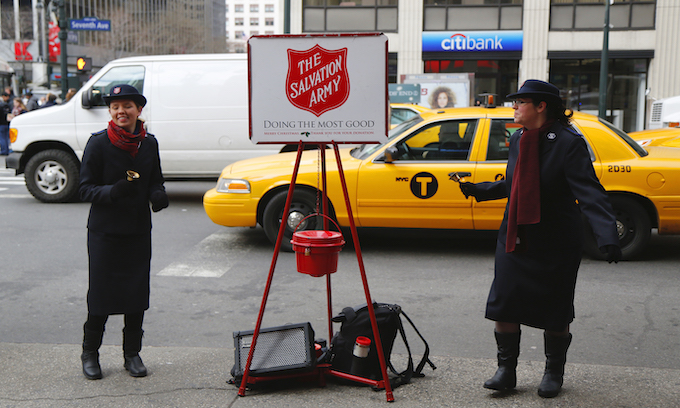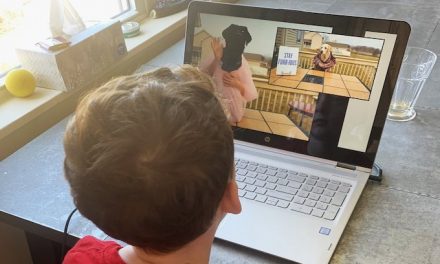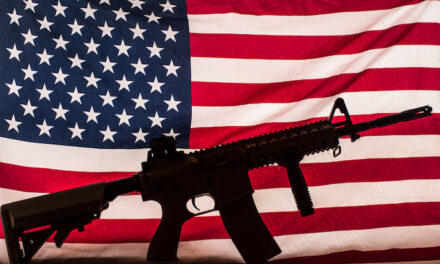For 19 years, 85-year-old Dick Clarke has raised money for The Salvation Army during the holiday season — 18 of them ringing a bell beside a red kettle for donations outside Nordstrom’s downtown Seattle store. He loved the conversations and the feeling of giving back through the more than $100,000 he collected. He volunteered five days a week, six hours a day.
“The best thing I like about Thanksgiving is the next day I go to work,” said the retired teacher and principal.
Or that’s how he used to feel. This year, Nordstrom told The Salvation Army it would no longer allow solicitation in front of its doors.
Beyond stating that policy, Nordstrom spokeswoman Jennifer Tice Walker did not answer questions about the change. But Clarke said he was told in a meeting last week with head of stores Jamie Nordstrom that LGBTQ employees said The Salvation Army’s presence made them uncomfortable.
The Salvation Army — an evangelical Christian organization that is one of the world’s largest providers of homeless shelters, food banks, youth programs and other social services — has long had a reputation of being unwelcoming to LGBTQ people. Leaders say their organization, like many religious groups, espouses a theology that sees marriage as between a man and a woman. But they say they do not discriminate when providing services or hiring staffers. The organization has been trying to change its image, in part by setting up a website highlighting services provided to the LGBTQ community, including a Las Vegas shelter for transgender individuals intended as a safe space.
That hasn’t convinced some, who have urged a boycott on Salvation Army giving — a notion that seemed behind Chick-fil-A’s recent announcement that it would stop donating to the organization as well as another Christian group. Mark Baldwin, a ringer standing in front of Pacific Place, and a part-time chef who himself has received Salvation Army clothing and toy donations for his family, said he’s been called “bigot” and “homophobe.”
The city of Seattle, which like King County contracts with The Salvation Army to provide homeless shelters, will next month begin an “equity audit” in response to “concerns expressed by the community that Salvation Army is not a safe place for LBGTQ persons experiencing homelessness,” wrote Jason Johnson, acting director of the city’s Human Services Department, in a letter to Salvation Army officials in early December.
City spokesman Mark Reardon said he does not know if the concerns — raised initially to All Home’s coordinating board, which distributes federal funding for the county’s homelessness response — arose from any specific instances of alleged discrimination. County and All Home officials said they do not know, either.
Certainly, such discrimination would run afoul of city and county contract stipulations, and many people’s idea of the type of organization they want to support. But there is a larger ongoing debate about The Salvation Army, one that by implication extends to many religiously affiliated aid groups: Does an organization’s position on same-sex relationships color the work it does?
“Surely no one wants to see programs for those living in poverty eliminated simply because some disagree with the theology of those who provide them,” argued David Hudson, national Salvation Army commander, in a November op-ed in USA Today.
The Salvation Army is among 12 nonprofits that benefit from donations raised by The Seattle Times Fund For The Needy.
Clarke says he disagrees with The Salvation Army’s stance on same-sex relationships but could separate out the faith side of the organization from its service side.
Not so, said Monisha Harrell, chair of Equal Rights Washington. “Either you are an accepting organization or you are not,” she said. People can’t be expected to know which side is saying what and how that will affect their treatment, she added.
In his op-ed, Hudson attributed the Salvation’s Army’s anti-LGBTQ image to “misinformation and mass bandwagon-jumping.”
There have been other factors over the years: reluctance, during the ’90s, to offer benefits to employees in same-sex partnerships; joining other organizations to oppose same-sex marriage; a 2012 comment from an Australian Salvation Army leader that gay people should be put to death (prompting an apology from an organization spokesman); and sporadic complaints of discrimination around the country. In 2017, the Salvation Army was one of four organizations operating substance-abuse centers accused by the the New York City Commission on Human Rights of refusing to accept transgender patients and discriminatory housing practices, like designating rooms based on people’s assigned gender at birth rather than their identity.
Laura Lindstrand, policy analyst for the Washington State Human Rights Commission, said she could not find any complaints against The Salvation Army related to LGBTQ discrimination.
Lt. Col. Bill Dickinson, commander of The Salvation Army’s Northwest Division, said staffers follow the individual’s lead when it comes to assigning shelter beds. “Do you self-identify as a man or a woman?” Beyond that, he said The Salvation Army doesn’t delve into anyone’s sexual orientation or gender identity.
“If you have experienced discrimination by The Salvation Army, I would like to know where and when so we can address it,” Dickinson said in an interview last week during a holiday toy giveaway at CenturyLink Field Event Center.
“We have a lot of employees who are LGBTQ,” he added. “Some are here today.”
Nothing stops them from becoming managers, including department directors, he said, although commanders like him are ordained ministers who sign a covenant saying they subscribe to The Salvation Army’s theology. Other religious groups, including World Vision and CRISTA Ministries, have not welcomed LGBTQ people or those in same-sex marriages into the organization.
A few local Salvation Army staffers have recently volunteered at events put on by the Greater Seattle Business Association (GSBA), an LGBTQ chamber of commerce. Louise Chernin, GSBA president and CEO, said she’s glad to have them but unsure whether her organization will develop a closer relationship with The Salvation Army. “We’re still working to evaluate that,” she said.
Meanwhile, the city will be conducting interviews with Salvation Army leaders, staff and clients, according to Johnson’s letter. “We are approaching this process with a spirit of cooperation,” he wrote.
The Salvation Army continues its red kettle campaign through Christmas Eve. As of last week, the Northwest Division had raised $3.1 million, more than a million less than last year’s total, which the organization attributed to six fewer days this year between Thanksgiving and Christmas. The division’s overall annual budget is about $80 million, according to Dickinson.
As for the Nordstrom employees who complained, Clarke said he asked Jamie Nordstrom if he might be able to meet some of them to work something out, and Nordstrom said he’d look into it. The Salvation Army has offered Clarke other locations, but at his age, he said, he needs to be somewhere convenient. At his home in a First Hill retirement community, he keeps four bells at the ready.
___
(c)2019 The Seattle Times
Visit The Seattle Times at www.seattletimes.com
Distributed by Tribune Content Agency, LLC.
—-
This content is published through a licensing agreement with Acquire Media using its NewsEdge technology.



















Recent Comments